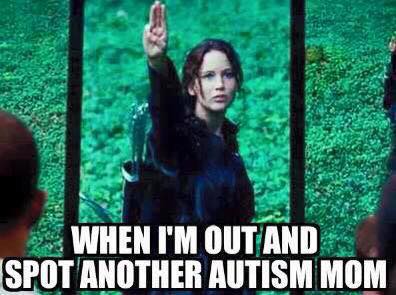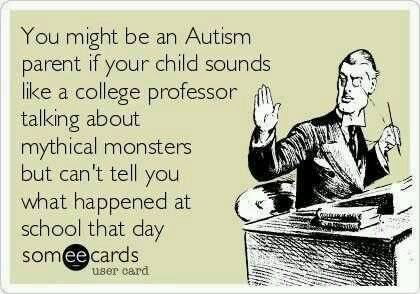October 13, 2016
 Something that I try very hard to remember when dealing with Autism Parent Land is this: Just because Susie had an experience that doesn’t match mine, it doesn’t mean her experience is invalid and it doesn’t mean mine is invalid.
Something that I try very hard to remember when dealing with Autism Parent Land is this: Just because Susie had an experience that doesn’t match mine, it doesn’t mean her experience is invalid and it doesn’t mean mine is invalid.
I apply this not only to the plethora of treatment options available (nothing works for every kid), but also to theories of causation. My child regressed after a virus. I know many children who regressed after vaccines, and I know many kids who weren’t vaccinated who just never developed properly. I also know parents who consider autism a “personality quirk” — their experience is valid too.
Let’s review what autism actually is: Autism Diagnostic Criteria.
Go read it. I’ll wait.
Autism is not diagnosed with a blood test, nor with a brain scan, nor with a stool sample. There is no biomedical marker that will diagnose it. It’s defined as a series of behavioral symptoms, combined with the understanding that these symptoms are not better understood by a different diagnosis. It’s basically a hands-thrown-in-the-air/we-can’t figure-it-out exclusionary diagnosis.

Because there are so many factors that are involved, it means that children with autism diagnoses present symptomatically very differently from each other. It’s depressing to think about, and if you haven’t already learned it — I’m sorry. It can be a bitter pill because it’s at the core of the infighting between the “factions” in Autism Parent land. There is the faction that says “this is my kid’s personality, and there’s nothing that needs curing,” and there is the faction that says “my kid had an injury, and injuries can be healed.”
I did something earlier this year. I joined the local autism and Asperger’s association in my town. I joined for a few reasons, fellowship with real live people being high on the list. And I was told when I joined that talk about vaccines being causative was not allowed because of the horrible infighting and drama those discussions cause in the group (several other topics also aren’t allowed). Fair enough, I am perfectly capable of respecting rules when I’m given them up front. Not an issue.
So for the first time, I’ve got my feet in both factions. I’m very strongly of the opinion that my son had a viral brain injury, likely encephalitis, which caused his regression around age three. And now I’m part of a group where the majority believes that autism is just a quirk of personality. It’s an astonishing contrast.
There are kids being diagnosed with autism as teenagers, and their parents tell me their primary presenting symptom is inflexibility. And I’m over here going, “But they sleep? Do they smear feces? They converse?” The difference between their child and mine is a gaping chasm. How is it possible that my experience — where my son went from speaking in sentences, playing appropriately with peers, etc. to screaming, smearing feces, and unable to articulate even a word — is called autism, and their experience of a child who is inflexible is also called autism? I don’t get it.

Back to the beginning statement: Just because they had a different experience than I did doesn’t invalidate either experience. I have absolutely no right to try to convince them their child is vaccine injured, and they have no right to try to convince me mine is not.
If we could all embrace this philosophy — across the various biomed groups (stop it with the parent blaming already), and between factions. If we could agree that we don’t have to agree on causation to focus on services for our kids. . . oh, the things we could accomplish!
~ JuicyFruit
For more by JuicyFruit, click here.

















I agree!
I do want to comment on the idea that people can have the same diagnosis and have it affect them in a different way. This seems really difficult for some people to understand about the autism community and I don’t really understand why. Yes, the autism spectrum is particularly varied, but really nearly every developmental or pathological condition has a spectrum. Some people with Down’s Syndrome can function pretty well in our society while others are not able to do so. Same holds true for celebral palsy, spina bifidia, etc. Even cancer and heart disease have a spectrum if you will as there are different stages. I just do not understand why people are so stuck on the notion those who are “less affected” do not actually have issues or that the diagnosis for them is false. Their issues may be different, but I can gaurantee you they have issues. No one would say that a high functioning person with Down’s Syndrome doesn’t actually need any accommodations or that they don’t really have Down’s Syndrome. My son is higher on the spectrum, but he has worked his little tail off on his issues. He may seem typical to a lot of people in certain situations and some have doubted that his autism is real, which is a blessing and a curse to be honest. Nonetheless, the blood, sweat and tears poured into him are so vast that I can’t even mention them all here, but it has all been real and it has been hard work. Please remember that you can never truly understand everyone’s personal journey.
This is why I get on the cases of people who say “there’s no rise in incidence, we’re just overdiagnosing!” Um, no. No parent is going out of their way to get a diagnosis and treatment because their child DOESN’T need help.